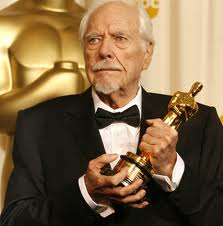Usually I don’t allow myself to have favorite artists? Do I prefer Bach to Beethoven? Or to Schubert? But I have to admit that Robert Altman is my favorite movie director.
This doesn’t mean I want to make a case that he is the “best” movie director ever. I don’t believe in such nonsense. I’d never say that Altman is “better” than Kurosawa, Keaton, Bergman, Carné, or many others I could name. But there’s something about Altman’s greatest films that makes me feel especially close to them, and that they do what I want to see more than anyone else’s.
Several years ago my local “art” movie house, Upstate Films in Rhinebeck, had a single showing of “Nashville.” I’ve seen that numerous times, but of course I hadn’t seen it in a theater since it was new. There is one glaring flaw in the film that gets on my nerves: the character of Opal, the British TV reporter played by Geraldine Chaplin. I don’t find her at all convincing, and although I know the stupidity of her reports is intended to make a point I think it’s too exaggerated to be plausible. (I hope.)
Aside from that, though, “Nashville” seems to me a magnificent statement of the state of American culture in the mid-70s (it was made in 1975), as seen through the microcosm of the country music scene in the city of Nashville. I’ve usually found that particular genre of music one of the few I don’t like, and I suspect Altman shared my opinion. As inventive as always, Altman hit upon the brilliant strategy of having the actors who play the roles of singers write their own songs and do their own singing. Some of them can sing, but only Keith Carradine could write a convincing song. (Ironically, it won an Oscar.) So most of the songs performed by these supposed icons of country music are pretty dumb, making in a subtle way a point that could easily have been overstated.
The interweaving of numerous stories in a single film is so much Altman’s invention that anything similar these days is immediately tagged as Altmanesque by film critics. “Nashville” was the first such Altman film to take on such an elaborate structure, although in a less complex construction it’s the basis of his first successful feature, “MASH” (Altman once stated that, although some of his films had lost money for the studios, they still owed him a debt of gratitude for “MASH” because it eventually earned a billion dollars for its studio through sales and TV royalties.) Other Altman classics like “Short Cuts” and “Gosford Park” have similarly complex stories.
“MASH” is only the first of Altman’s great films. Although “Nashville” might be my favorite of all of them, I might also love “3 Women” just as much. That magnificent, mysterious film, not one of his best known, is an exploration of the female psyche so convincing that it’s surprising to learn that Altman himself wrote it. Another of my many favorites, almost unknown today, is “Images,” a suspense story with a stunning shock ending which seems obviously a tribute to Alfred Hitchcock, an early mentor of Altman’s. (Before his successful movie career, Altman worked in television for a decade, directing episodes of “Alfred Hitchcock Presents,” “Combat,” “Bonanza,” and other series. In his mature career he went back to TV for several excellent projects, the greatest of which was “Tanner ‘88,” made for HBO.)
I’m lots fonder of “Popeye” than most critics seem to be. It’s a bizarre musical, with great songs by Harry Nilsson, and Robin Williams and Shelley Duvall are superb as Popeye and Olive Oyl. After that flopped, Altman had trouble getting funding for films for some years, and he worked mostly at making film versions of plays. Among those, “Secret Honor” is truly outstanding, with Philip Baker Hall as an amazing Richard Nixon. (“Beyond Therapy” is the only Altman film I’ve been unable to watch through. I find the Durang script unbearable. Durang didn’t like the film either.)
In the 1990s, Altman’s career had a renaissance. The post-1990 films are uneven, including such artistic flops as “Kansas City” (despite an amazing performance from Harry Belafonte”) and “Ready to Wear.” But they also include such masterpieces as “The Player,” “Short Cuts,” “Gosford Park” and even his last film, “A Prairie Home Companion,” based on the radio program and using some of its regulars (including host Garrison Keillor). When Altman died, he was working on a project called “Hands on a Hard Body,” based on the odd contests held by truck dealers in which the last person standing and still awake with both hands on a truck wins the truck. What a delight that would have been!
I haven’t been spending enough time with Robert Altman recently, but that’s going to change. While clearing out my collection of old VHS tapes I’ve found some Altman material I haven’t seen in years, including an interview done after “Vincent and Theo” was released and several TV projects including two one-act Harold Pinter plays (“The Dumb Waiter” and “The Room”). I’m going to copy all of the tapes to DVD and watch them in the process, and then I’m going start going through the features in a leisurely manner. It’ll probably take me two years or more. But what a trip that’s going to be!

September 25th, 2012 at 6:17 pm
I like Altman and DeSica and some others, and this is quite a blog. Also, I lie. Thanks Leslie, good job.